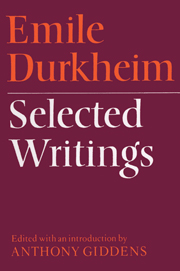Book contents
- Frontmatter
- Contents
- Preface
- Abbreviations
- Introduction: Durkheim's writings in sociology and social philosophy
- 1 The field of sociology
- 2 Methods of explanation and analysis
- 3 The science of morality
- 4 Moral obligation, duty and freedom
- 5 Forms of social solidarity
- 6 The division of labour and social differentiation
- 7 Analysis of socialist doctrines
- 8 Anomie and the moral structure of industry
- 9 Political sociology
- 10 The social bases of education
- 11 Religion and ritual
- 12 Secularisation and rationality
- 13 Sociology of knowledge
- Index
13 - Sociology of knowledge
Published online by Cambridge University Press: 05 August 2012
- Frontmatter
- Contents
- Preface
- Abbreviations
- Introduction: Durkheim's writings in sociology and social philosophy
- 1 The field of sociology
- 2 Methods of explanation and analysis
- 3 The science of morality
- 4 Moral obligation, duty and freedom
- 5 Forms of social solidarity
- 6 The division of labour and social differentiation
- 7 Analysis of socialist doctrines
- 8 Anomie and the moral structure of industry
- 9 Political sociology
- 10 The social bases of education
- 11 Religion and ritual
- 12 Secularisation and rationality
- 13 Sociology of knowledge
- Index
Summary
THOUGHT AND REALITY
…even the most primitive religions are not, as is sometimes believed, merely phantasies that have no basis in reality. Certainly they do not express the things of the physical world as they are; they have little value as an explanation of reality. But they do interpret, in a symbolic form, social needs and collective interests. They represent the various connections maintained by society with the individuals who make it up as well as with the things forming part of its substance. And these connections and interests are real. It is through religion that we are able to trace the structure of a society, the stage of unity it has reached and the degree of cohesion of its parts, besides the expanse of the area it inhabits, the nature of the cosmic forces that play a vital role in it, etc. Religions are the primitive way in which societies become conscious of themselves and their history. They are to the social order what sensation is to the individual. We might ask why it is these religions distort things as they do in their processes of imagery. But is it not true that sensation, equally, distorts the things it conveys to the individual? Sound, colour and temperature do not exist in the world any more than gods, demons or spirits do. By the fact alone that the representation presupposes a subject who thinks – (in one case, an individual, in the other, a collective subject) – the nature of this subject is a factor in the representation and distorts the thing represented.
- Type
- Chapter
- Information
- Emile Durkheim: Selected Writings , pp. 250 - 268Publisher: Cambridge University PressPrint publication year: 1972



